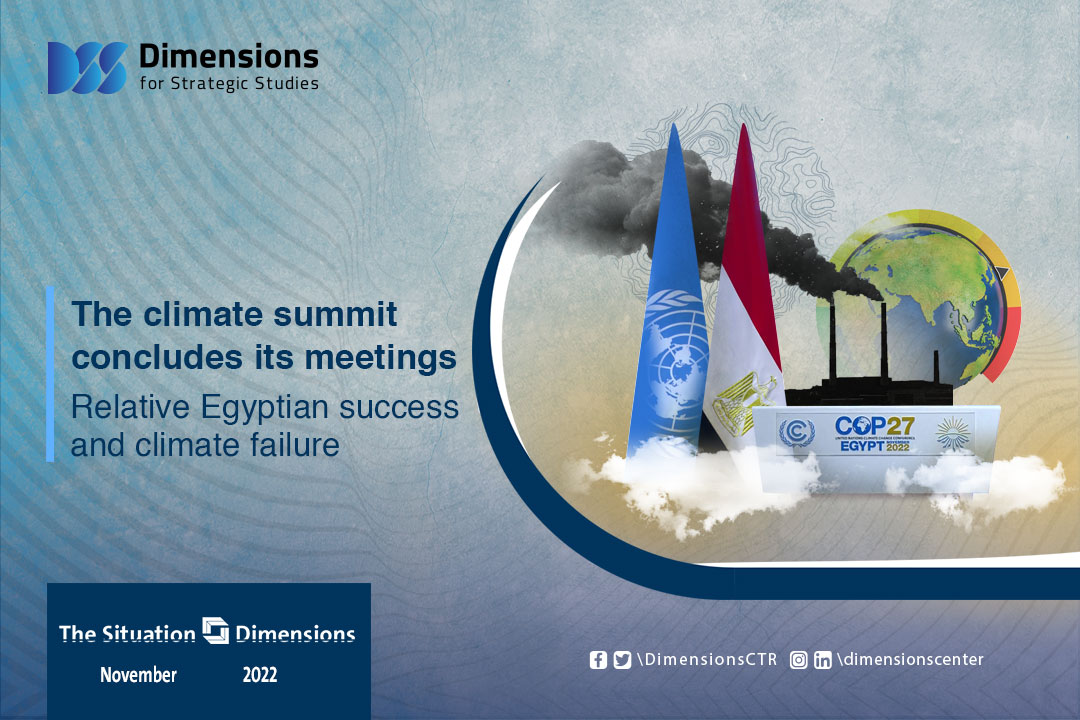
The climate summit concludes its meetings
2022-11-211868 view
The works of the 27th Climate Summit, which started on the 6th of the same month, concluded its meetings in Sharm el-Sheikh at dawn on November 20.The biggest winner from organising the summit was the host country, as it showed its ability to organize a global summit attended by the most prominent world leaders, regardless of the criticism leveled by these same countries against the Egyptian performance in the file of human rights and other issues. Moreover, Egypt was also able to organize the summit with minimal losses in terms of protests locally and at the level of international activists, as Cairo was able to control the local security pace. No demonstrations took place during the summit period despite the calls for demonstrations on 11/11/, while foreign activists were restricted to Specific places near the venue of the summit. However, the security calm in numerous Egyptian cities was not reflected in a similar calmness in the conference halls, which witnessed the presence of some human rights issues, especially the case of the detainee Alaa Abdel Fatah.
Although the work of the summit was extended for an additional day in order to give the participants the opportunity to reach a climate agreement, this did not happen, as the meeting failed to reach new goals to reduce the speed of greenhouse gas emissions, which is one of the main objectives of the conference, following up on the results of the previous summit in Glasgow last year and the implications of the 2015 Paris Agreement.
The conference; however, was able to achieve a partial success; although the host country described it as a historic achievement represented in the establishment of “the Loss and Damage Fund”, whose idea is based on the rich industrial countries compensating the poor countries affected by climate change. But the approval of this fund does not mean that it will be able to solve the problems facing the affected countries, at least soon. The idea of the fund was approved, but there was no talk about how to finance it, which is the most important dilemma. It is not expected that the fund will be financed in a way that compensates even for a small part of the climate problems that the poor countries suffer from, and that feeding the fund on an annual basis and agreeing on spending allocations will be the focus of international problems and rivalries for years to come.
The failure of the summit to reach an agreement is due to the same reasons that block all the attempts to reach climate agreements, as any restrictions on the use of fossil fuels and the reduction of carbon emissions face rejection or obstruction from two main parties, namely: the major industrial countries, especially China, and the oil-producing countries. Any restrictions that will be imposed will have negative effects on these two groups.
On the other hand, most of the countries affected by climate change are poor countries, such as African countries, Pakistan and Bangladesh; and these countries do not have tools to impose their vision in international forums, unlike the first group that has political influence and economic power.
In general, the climate summit brings together parties unequal in power and duties; therefore meeting collectively annually will not contribute much to achieving environmental breakthroughs, unless the most powerful parties agree among themselves - which seems unlikely so far, unless renewable energy can transform – to the efficient economic form that forces the producers of fossil fuels and their major consumers to review their selfish policies against the planet and its inhabitants.





